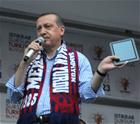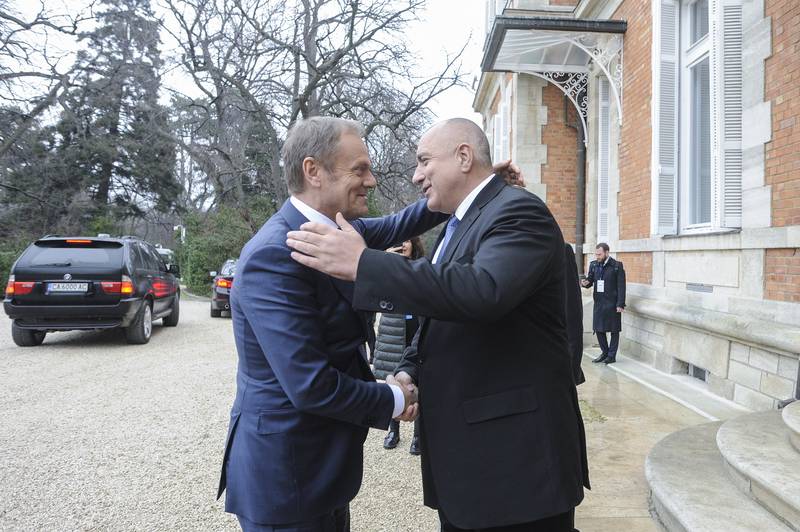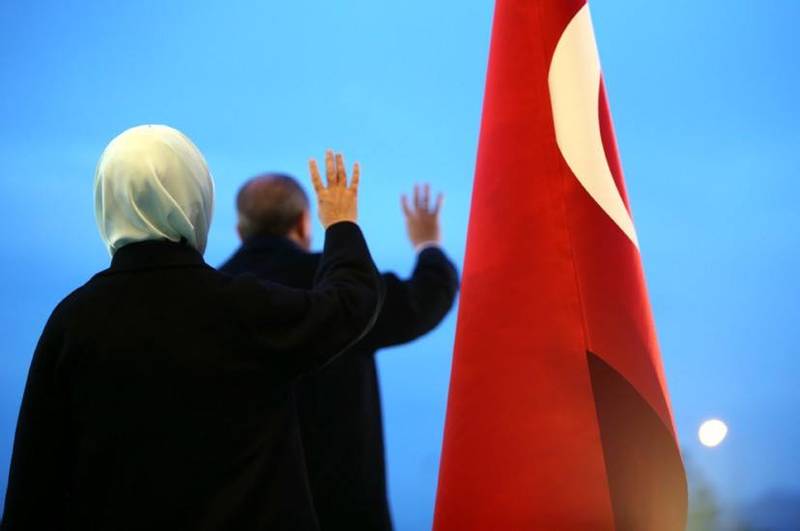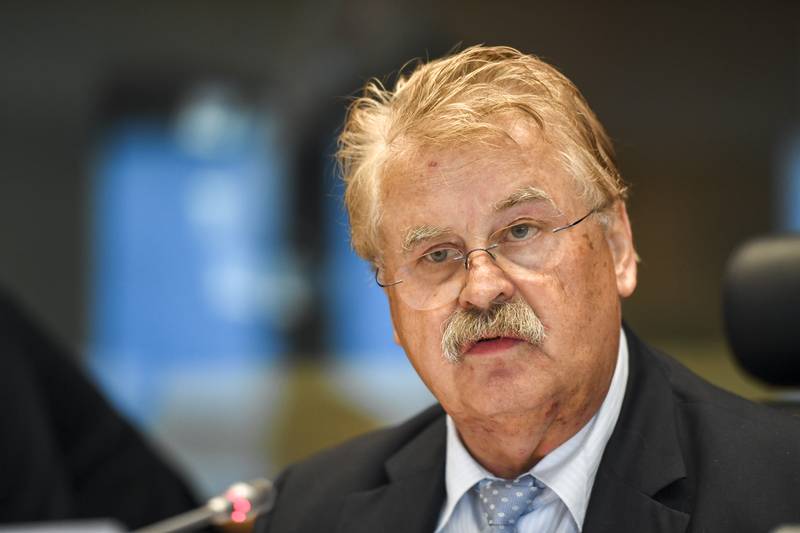Impressive electoral victory of the conservatives in Turkey
Adelina Marini, June 17, 2011
 It is very rare in democratic elections a party to win an absolute majority three times in a row. And not only this but also to increase its results. This is the case with the Justice and Development Party (AKP) of Recep Tayyip Erdogan, who will be a prime minister of Turkey for a third consecutive term. In the elections on Sunday (June 12) Mr Erdogan's party won almost 50% of the votes, which is an improvement compared to the previous elections in 2007, when 47% of the voters trusted the AKP. The second largest but with significantly smaller result is the other big party in the country - the Republican People's Party (CHP) of Kemal Kiliçdaroğlu. The third power in Turkey again is the nationalist movement and the fourth is the pro-Kurd party.
It is very rare in democratic elections a party to win an absolute majority three times in a row. And not only this but also to increase its results. This is the case with the Justice and Development Party (AKP) of Recep Tayyip Erdogan, who will be a prime minister of Turkey for a third consecutive term. In the elections on Sunday (June 12) Mr Erdogan's party won almost 50% of the votes, which is an improvement compared to the previous elections in 2007, when 47% of the voters trusted the AKP. The second largest but with significantly smaller result is the other big party in the country - the Republican People's Party (CHP) of Kemal Kiliçdaroğlu. The third power in Turkey again is the nationalist movement and the fourth is the pro-Kurd party.
What is happening in Turkey?
The dry election numbers can be used for any interpretations, depending on what attitude you have toward Turkey. It is important to note, however, that in fact none of the above mentioned parties is no longer what it used to be - at least according to the analysis of Mustafa Akyol*, entitled Who are the Turks?, published as part of the paper of the European Council for Foreign Relations What Does Turkey Think?, presented in Bulgaria too last week. It divides Turkey into several "nations", by describing the biggest group as conservatives (but not conservatives in the Western meaning of the word, more or less - traditionalists). Its adherents often either live in or originate from Anatolia and their religion is Sunni Islam. For them, the Ottoman Empire was the golden age of Turkey and their lifestyle is a synthesis of religious identity and modern life.
or originate from Anatolia and their religion is Sunni Islam. For them, the Ottoman Empire was the golden age of Turkey and their lifestyle is a synthesis of religious identity and modern life.
In the past decade, Mr Mustafa Akyol writes, Erdogan and his AKP party has emerged as the natural political choice for – if not the embodiment of – this conservative camp.
The second largest group are the Secularists who are opponents of the conservatives and are often called Kemalists. Almost all of them identify themselves strongly with the secular cultural revolution of Kemal Ataturk and, quite naturally, for them Turkey's golden age was the period when the Kemalist Republic overthrew the Ottoman Empire. The secularists are famous with their hostility towards religion. The CHP has maintained its share of around 20-25% of the votes at this election too. Moreover, the party registered a slight increase of support, as compared to 21% in 2007 in 2011 the party was supported by 26%. It is important to note that there was a high turnout at the elections on June 12 - 87%. In other words, the shares of these parties are quite representative.
According to Mustafa Akyol the cultural gap between the conservatives and the secularists is both vast and socially illuminating. For example, he points out, Turks themselves are sometimes instantly able to locate each another within one of these distinct groups. A headscarf or a particular form of moustache indicates a conservative identity, whereas an Ataturk pin would signal the opposite. Even the names that people choose for their children are politically loaded, the columnist with the Hurriyet daily notes. A conservative family might opt for clearly Islamic names such Ayse, Abdullah or Ahmet, whereas a secularist family might prefer more suggestive names such as Cagdas, Evrim or Devrim (which literally mean “Contemporary”, “Evolution” and “Revolution”). Moreover, the author continues, there are differences in the language itself.
 The third force are the intellectuals, more popular as liberals, who do not share the Kemalist nostalgia for the 1930s and want to see the development of contemporary liberal democracy in Turkey. Their influence in society however, is not of much significance, Mr Akyol deems, as most liberals are secular people, even more secular than the Kemalists themselves, but are not secularists.
The third force are the intellectuals, more popular as liberals, who do not share the Kemalist nostalgia for the 1930s and want to see the development of contemporary liberal democracy in Turkey. Their influence in society however, is not of much significance, Mr Akyol deems, as most liberals are secular people, even more secular than the Kemalists themselves, but are not secularists.
The fourth force are the nationalists, represented by the Nationalist Action Party (MHP), which enjoys a little over 10% support. Mustafa Akyol warns, though, that it would be misleading to use the term "Turkish nationalism" for this group, as nationalism can be found within both the conservative and the secularist camps. What distincts them from the rest is that nationalism is the only thing they offer at their stall.
Through the years, especially the past 10 years since Turkey is in an economic upsurge, the conceptions of political parties and the expectations of voters have started to change from their roots. The country's economy has tripled, its international influence grew significantly too, which gave a lot of reason for fears to the West. During Mr Erdogan's two terms, Turkey has been maintaining a course of good relations with its neighbours - a behaviour which was not always to the liking of the country's allies in NATO and its partners in the European Union, with which  Turkey has been negotiating for accession for 6 years now, frozen on 8 chapters and on the rest with almost no progress at all.
Turkey has been negotiating for accession for 6 years now, frozen on 8 chapters and on the rest with almost no progress at all.
The Arab spring has thrived around Turkey
Recep Tayyip Erdogan won a convenient majority for a third time in a very complex geopolitical context. If only half a year ago Turkey was scaring the world with its growing influence and pretenses to be a key factor in the region, where now the withdrawal of the US is being felt sensibly, the burst of the Arab spring put the government in Ankara before a serious challenge.
But not from the perspective of the growing rebukes of Premier Erdogan that he is succumbing to the temptation of autocratism. But, as the Turkish Minister for Foreign Affairs, Ahmet Davutoglu, has brilliantly described it in an interview with Der Spiegel only days before the elections: "there are two historic anomalies in the Arab world: the colonialism of the 20th century, which divided Arab societies, and the Cold War, which contributed to the establishment of autocratic regimes in the region. A transformation like the one the Soviet bloc experienced in the 1990s didn't happen in the Arab world. But now change has come".
To the question about the different reactions Turkey had for the situations in Egypt and Libya, Ahmet Davutoglu responded boldly and self-confidently by explaining that the government in Ankara had expressed support for the events in Egypt (Mr Erdogan was the first world leader to ask for Hosni Mubarak's resignation), because there the army behaved neutrally. Unlike Libya, Mr Davutoglu specifies. According to Ankara's estimation, in Libya there was a possibility of a blood bath and a danger of division of the country, which was why the government waited before reacting.
But is this not all about protecting Turkish economic interests in Libya, Der Spiegel asks - a question which was asked many times to various European governments. This is precisely what the Turkish top diplomat used by stating: "No, you're completely wrong. We had a humanitarian concern in Libya. We evacuated more than 10,000 people from 63 countries [among which Bulgaria] in the first few days of the Libyan crisis. If you are talking about economic interests - I'm not mentioning any names, but you should ask yourself which capitals Gaddafi visited. Who kissed Gaddafi's hand?" To the attempt of the influential German magazine to gain a name, offering that of Italian Prime Minister Silvio Berlusconi, Ahmet Davutoglu answered concisely: "No comment".
In Europe together or with Europe together?
 In the same interview the Turkish foreign minister again stated the conviction of the government that Turkey's place is in the European Union, especially in the context of the events in the Arab world. A thesis, supported by Emiliano Alessandri in an analysis for the Carnegie think tank in Washington. According to the analysis of the organisation Turkey has realised that the popular movements in its most direct neighbourhood undermine all the links which the country has been building for the past decade. Currently Turkey's zero-problems-with-neighbors policy looks increasingly untenable in the context of its rapidly deteriorating regional security environment. Which is why, the analysis goes on, Turkey started rediscovering the importance of European and transatlantic links.
In the same interview the Turkish foreign minister again stated the conviction of the government that Turkey's place is in the European Union, especially in the context of the events in the Arab world. A thesis, supported by Emiliano Alessandri in an analysis for the Carnegie think tank in Washington. According to the analysis of the organisation Turkey has realised that the popular movements in its most direct neighbourhood undermine all the links which the country has been building for the past decade. Currently Turkey's zero-problems-with-neighbors policy looks increasingly untenable in the context of its rapidly deteriorating regional security environment. Which is why, the analysis goes on, Turkey started rediscovering the importance of European and transatlantic links.
But obviously there is no reciprocity. To put it softly, the welcoming joint statement of European Union's leaders - Mr Jose Manuel Barroso and Mr Herman Van Rompuy - was cool. "We congratulate you on the outcome of the general elections held on 12 June. The results open the way to further strengthening Turkey's democratic institutions, as well as to the continued modernisation of the country, in line with European values and standards", is said in the short but telling statement, conveyed to Mr Erdogan. "We are convinced the coming period offers new opportunities for further reforms, including work on a new constitution in the  broadest possible consultation and a spirit of dialogue and compromise, and for strengthening confidence between Turkey and all EU Member States".
broadest possible consultation and a spirit of dialogue and compromise, and for strengthening confidence between Turkey and all EU Member States".
The key words in the above quote are "broad consultations for the new constitution" - one of the both criticised and praised initiatives of Erdogan's government in the process of responding to Europe's expectations. A big criticism to the amendments of the constitution is that the government did not involve the civil society and various vulnerable groups in the debates of the amendments. Another key word is "confidence" and "all" member states of the European Union.
Precisely on the basis of this European environment, Carnegie's analysis shows that the relations between Turkey and the European Union in the new context of an emerging new order in the Middle East lead to warming of the relations between the two sides, but in no way they do not mean a renewed support for Turkey's accession in the Union. Ankara's membership remains frozen because of the unresolved Cyprus issue and because of the anti-Turkish moods in some member states. In any case, the new context obliges the two countries to reconsider their relations and to benefit as much as possible from them. As Carnegie recommends, "the West will be stronger if it enjoys Turkey’s cooperation … and vice versa".
 It is evident that the moment has come for an open and honest dialogue between the EU and Turkey, but not with the EU institutions - between the member states and Turkey. The EU can no longer use the perspective of Turkey's membership as a carrot to achieve transformation according to the Western model in the country and from much longer ago it cannot use the stick. It is a fact that the partnership between the EU and Turkey is extremely important, the question is what should be the basis for it.
It is evident that the moment has come for an open and honest dialogue between the EU and Turkey, but not with the EU institutions - between the member states and Turkey. The EU can no longer use the perspective of Turkey's membership as a carrot to achieve transformation according to the Western model in the country and from much longer ago it cannot use the stick. It is a fact that the partnership between the EU and Turkey is extremely important, the question is what should be the basis for it.
It is high time to get rid of the myths on some forms of cooperation, proposed in the past and proven successful with partners like Russia, for example - which, although a non-Muslim country has peculiarities of its own, and also raise the issue of confidence with the EU, about cooperation and common interests. It is clear that EU's confidence in Turkey will not emerge soon. This is why it is better to move towards another form that would allow Turkey and the EU sit down as equals and talks about on which areas they can work together and how. After all, there is nothing insulting in this - it is a matter of values and civilisation.
*Mustafa Akyol is a columnist with The Hurriyet daily. Articles of his were published also in the influential magazine Foreign Affairs, in the Newsweek, The Washington Post, the Wall Street Journal and the International Herald Tribune.
 Donald Tusk, Boyko Borissov | © Council of the EU
Donald Tusk, Boyko Borissov | © Council of the EU | © Turkey Presidency
| © Turkey Presidency Elmar Brok | © European Parliament
Elmar Brok | © European Parliament